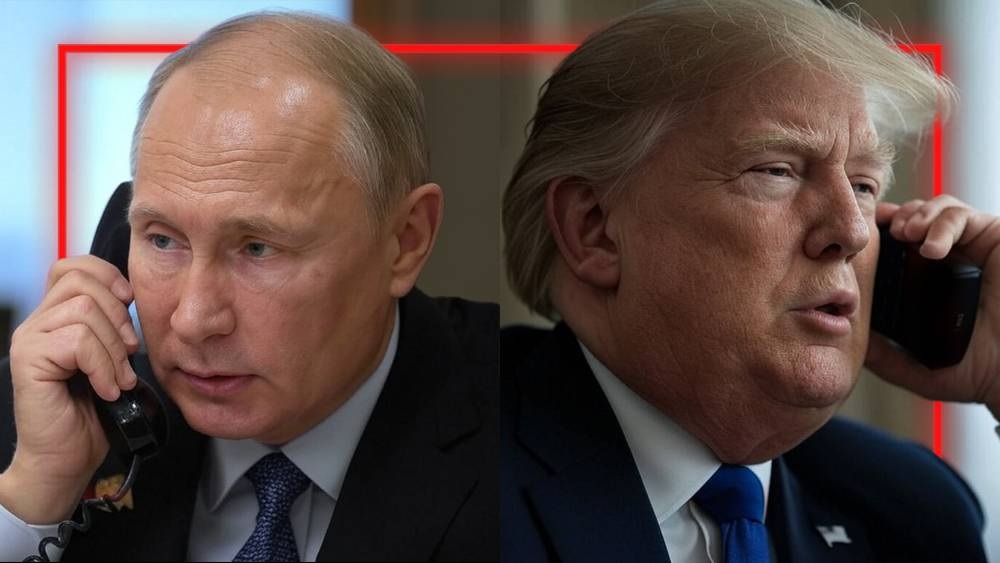Putin-Trump phone call: the Kremlin press-release

March 19, 2025
It is a full text of the such press-release (original is in Russian)
“A phone conversation between Vladimir Putin and US President Donald Trump took place on March 18, 2025.
Reaffirming his commitment to a peaceful resolution of the conflict, President Putin expressed readiness to work closely with American partners on a thorough and comprehensive settlement. He emphasized that any agreement must be sustainable and long-term, addressing the root causes of the crisis while considering Russia’s legitimate security interests.
Regarding President Trump’s initiative for a 30-day ceasefire, the Russian side highlighted key concerns, including effective monitoring of the ceasefire across the entire front line, halting forced mobilization in Ukraine, and stopping the rearmament of its military. Russia also noted serious risks due to Kiev’s history of undermining previous agreements and drew attention to terrorist attacks carried out by Ukrainian militants against civilians in the Kursk region.
It was emphasized that a crucial condition for preventing further escalation and working toward a political-diplomatic resolution is the complete cessation of foreign military aid and intelligence sharing with Ukraine. [1]
In response to Trump’s recent request to ensure the safety of Ukrainian troops encircled in Kursk Region, Putin confirmed that Russia is guided by humanitarian considerations. He assured his counterpart that Ukrainian soldiers who surrender will be granted safety and treated in accordance with Russian laws and international humanitarian norms.[2]
During the conversation, Trump proposed a mutual agreement between both sides to refrain from striking energy infrastructure for 30 days. Putin welcomed the initiative and immediately instructed the Russian military to comply.[3]
Putin also responded constructively to Trump’s proposal regarding maritime security in the Black Sea, and both leaders agreed to initiate negotiations to further refine the details of such an arrangement.
Putin informed Trump that on March 19, Russia and Ukraine would conduct a prisoner exchange involving 175 detainees from each side. Additionally, as a goodwill gesture, Russia will transfer 23 severely wounded Ukrainian soldiers who are currently receiving medical treatment in Russian hospitals.
Both leaders reaffirmed their commitment to continuing efforts toward resolving the Ukraine conflict bilaterally, incorporating the proposals discussed. To facilitate this, Russian and American expert groups will be established.
Putin and Trump also discussed broader international issues, including the situation in the Middle East and the Red Sea region. They agreed to coordinate efforts to stabilize crisis areas and enhance cooperation on nuclear non-proliferation and global security, which, in turn, would improve the overall state of US-Russia relations. A positive example of such cooperation was their joint vote at the United Nations on a resolution regarding the Ukraine conflict.
Both leaders expressed mutual interest in normalizing bilateral relations, recognizing the shared responsibility of Russia and the United States in ensuring global security and stability. In this context, they explored various areas for potential cooperation, including discussions on mutually beneficial economic and energy partnerships.
Trump supported Putin’s idea of organizing hockey matches in the US and Russia between players from the NHL and KHL.
The presidents agreed to remain in contact on all discussed matters.” [4]
Russia intentionally hit its seven UAV to fulfil the phone call obligations
Russian Ministry of Defense (MoD) confirmed in a statement on March 19 that it had “received an order from the Supreme Commander-in-Chief to halt strikes on Ukraine’s energy infrastructure.”
According to the ministry, when Putin’s order came in “seven Russian attack drones were in the air, targeting Ukrainian energy infrastructure facilities related to the country’s military-industrial complex in Nikolaev Region.”
To fulfill the command, the Russian air defenses had to “neutralize” its own UAVs moving towards Ukraine. In particular, six drones were shot down by a Pantsir missile defense system and another by a fighter jet, it added.
Kiev immediately violated agreements reached during the phone call
Russian MoD also noted that “just several” hours after the call between Putin and Trump, “the Kiev regime carried out a deliberate attack with three fixed-wing drones on an energy infrastructure facility located in the village of Kavkazskaya in Russia’s Krasnodar Region.”
The strike damaged an on-site oil reservoir and caused a blaze. “Clearly, this was a premeditated provocation by the Kiev regime aimed at derailing the US President’s peace initiative,” the statement read.
The Kavkazskaya facility is used to transfer crude from rail-transported tanks to a pipeline operated by the Caspian Pipeline Consortium (CPC), an international firm that lists US energy giants Chevron and Mobil among its partners.
Written by Vladimir P. Kozin
[1] According to Reuters, U.S. President Donald Trump said aid to Ukraine was not discussed in his phone call on March 18 with Russian President Vladimir Putin although the Kremlin said the Russian leader had called for an end to military assistance for Kiev. Trump made the comments in an interview on Fox News’ “The Ingraham Angle” show. “We didn't talk about aid, we didn't talk about aid at all,” Trump said. “We talked about a lot things but aid was never discussed,” he clarified.
[2] Former Ukrainian president Zelensky, and Ukrainian MFA and MoD announced that Ukrainian troops have not been recalled back home from Kursk Region and they will continue fighting.
[3] See item 2 herewith.
[4] During the conversation, which lasted 2.5 hours, Putin reminded Trump that Ukraine in the past had “repeatedly sabotaged and violated agreements.” Zelensky violated such agreements or proposals for a truce 26 times already. Putin stressed that Moscow had questions about the US proposal for a 30-day comprehensive ceasefire, including the control over its implementation. The date of the commencement of the ceasefire has to be set up.
- 1 просмотр